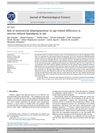January 2022 in “SSRN Electronic Journal” Mouse hair follicles age, causing more white hairs due to fewer pigment stem cells.
 October 2022 in “Frontiers in Cell and Developmental Biology”
October 2022 in “Frontiers in Cell and Developmental Biology” Aging skin is affected by inflammation, reduced stem cell function, and slower wound healing.
 58 citations,
December 2018 in “Nature Communications”
58 citations,
December 2018 in “Nature Communications” Male pattern baldness is mostly inherited, involves many genes, and is linked to other traits like early puberty and strong bones.
 January 2021 in “Faculty Opinions – Post-Publication Peer Review of the Biomedical Literature”
January 2021 in “Faculty Opinions – Post-Publication Peer Review of the Biomedical Literature” Aging affects the cells around hair follicles, which may influence female pattern hair loss and treatment options.
 April 2023 in “The journal of investigative dermatology/Journal of investigative dermatology”
April 2023 in “The journal of investigative dermatology/Journal of investigative dermatology” Aging changes female scalp cells, likely affecting hair health.
 July 2024 in “Age and Ageing”
July 2024 in “Age and Ageing” Men taking dutasteride may have a higher risk of age-related macular degeneration.
 6 citations,
April 2019 in “Journal of Cosmetic Dermatology”
6 citations,
April 2019 in “Journal of Cosmetic Dermatology” Hair loss affects women's self-esteem; treatments like minoxidil can help.
 1 citations,
May 2017 in “Asian journal of medical sciences”
1 citations,
May 2017 in “Asian journal of medical sciences” The dietary supplement significantly improved skin, nails, and hair in older adults.
 4 citations,
November 2018 in “Journal of pharmacological sciences”
4 citations,
November 2018 in “Journal of pharmacological sciences” Mild exercise reduces pain in older rats through a brain chemical, while intense exercise reduces pain in all rats through a different pain-blocking process.
30 citations,
August 2016 in “Skin research and technology” 3D imaging shows clearer details of skin structure changes with age.
 April 2024 in “Journal of cosmetic dermatology”
April 2024 in “Journal of cosmetic dermatology” Aging changes the red part of lips, affecting life quality and sparking cosmetic interest.
31 citations,
December 2012 in “British Journal of Dermatology” Korean women's hair thins, weakens, and greys with age, with mineral and sterol changes.
24 citations,
November 2015 in “Frontiers in Genetics” Nitroxide drugs can safely and effectively treat age-related diseases like macular degeneration and cardiovascular issues.
 16 citations,
November 2021 in “Antioxidants”
16 citations,
November 2021 in “Antioxidants” Managing oxidative stress might help treat low testosterone and related chronic diseases in aging men.
 April 2018 in “Journal of Investigative Dermatology”
April 2018 in “Journal of Investigative Dermatology” Aging reduces skin cell renewal and defense against germs due to TGFbeta, but blocking TGFbeta could help restore these functions.
 1 citations,
August 2023 in “Bioengineering”
1 citations,
August 2023 in “Bioengineering” PRP may help with aging and osteoarthritis, improving tissue repair and reducing surgery risk.
 1 citations,
May 2023 in “Frontiers in Endocrinology”
1 citations,
May 2023 in “Frontiers in Endocrinology” Autism's genetics are linked with early age of puberty and less hair loss, but not with hormone levels or polycystic ovary syndrome.
9 citations,
May 2021 in “Frontiers in aging neuroscience” Taking triterpenoids from Ganoderma lucidum over a long time can help slow down brain aging and improve overall health in mice.
 April 2023 in “Journal of Investigative Dermatology”
April 2023 in “Journal of Investigative Dermatology” Protein analysis shows aging changes in scalp cell types from women.
 December 2023 in “International Journal of Biological Macromolecules”
December 2023 in “International Journal of Biological Macromolecules” Chitosan nanoparticles loaded with Minoxidil were effective for hair growth but released the drug more slowly than the amphiphilic derivative.
 April 2018 in “The journal of investigative dermatology/Journal of investigative dermatology”
April 2018 in “The journal of investigative dermatology/Journal of investigative dermatology” Ginseng and Albizia extracts may help prevent age-related hair thinning.
 19 citations,
April 2015 in “Stem Cells”
19 citations,
April 2015 in “Stem Cells” Pro-IGF-II improves muscle repair in old mice.
2 citations,
February 2021 in “Developmental Cell” Middle-aged skin shows aging signs, and quercetin might help delay them.
 April 2018 in “The journal of investigative dermatology/Journal of investigative dermatology”
April 2018 in “The journal of investigative dermatology/Journal of investigative dermatology” Biotrinine® may be an effective treatment for chronic hair loss.
January 2019 in “Cell & developmental biology” 3D cultivation and prenatal stem cell exosomes improve stem cell treatment results, especially for hair loss and age-related issues.
 2 citations,
August 2019 in “International Journal of Cosmetic Science”
2 citations,
August 2019 in “International Journal of Cosmetic Science” Older age and certain lifestyles are linked to thinner, weaker hair, while how you see your hair relates to its thickness.
 17 citations,
February 2013 in “Cancer Epidemiology, Biomarkers & Prevention”
17 citations,
February 2013 in “Cancer Epidemiology, Biomarkers & Prevention” Early balding at 40 increases prostate cancer risk.
 86 citations,
July 2002 in “Clinical and Experimental Dermatology”
86 citations,
July 2002 in “Clinical and Experimental Dermatology” FPHL is a common, age-related, genetic hair loss with unclear causes and limited treatment options.
10 citations,
March 2019 in “Journal of neuroendocrinology” Testosterone affects stress hormone levels differently in adolescent and adult male rats.




















